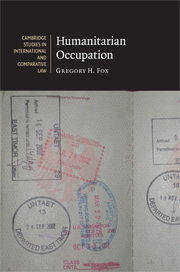Book contents
- Frontmatter
- Contents
- Acknowledgments
- Introduction
- Section I Historical antecedents
- Section II Why humanitarian occupation?
- Section III Legal justifications
- 6 Conventional legal justifications
- 7 The international law of occupation
- 8 Reforming the law: the Security Council as legislator
- Conclusions
- Index
- CAMBRIDGE STUDIES IN INTERNATIONAL AND COMPARATIVE LAW
8 - Reforming the law: the Security Council as legislator
Published online by Cambridge University Press: 02 February 2010
- Frontmatter
- Contents
- Acknowledgments
- Introduction
- Section I Historical antecedents
- Section II Why humanitarian occupation?
- Section III Legal justifications
- 6 Conventional legal justifications
- 7 The international law of occupation
- 8 Reforming the law: the Security Council as legislator
- Conclusions
- Index
- CAMBRIDGE STUDIES IN INTERNATIONAL AND COMPARATIVE LAW
Summary
It is difficult to avoid concluding that the three existing legal frameworks for humanitarian occupation have reached the limits of their explanatory powers. Consent, a Security Council Chapter VII resolution and the law of occupation all contain important shortcomings or incoherencies. Is this problematic? Is a definitive legal explanation really necessary this early in the life of a new phenomenon? While it may be true, as Adam Watson observes, that “legitimacy usually lags behind practice” – perhaps counseling patience on the part of international lawyers eager for doctrinal tidiness – he is equally correct that “a conspicuous and growing gap between legitimacy and practice causes tension and the impression of disorder.” Effectively resigning oneself to non liquet in this important area, at least for the moment, raises troubling questions about the completeness of the international legal system. Humanitarian occupation purportedly seeks to vindicate the international community's most fundamental interests, ambitiously seeking to establish democracy, human rights and territorial stability in post-conflict states. The humanitarian occupation missions have certainly been described in such portentous terms by their sponsors. Yet is it correct that the Council has pursued these important goals in ways that international law cannot adequately explain? If so, trouble awaits. As Hersh Lauterpacht observed, “[t]he completeness of law…is an a priori assumption of every system of law.” Most international lawyers believe (with some vigorous dissent) that “law is essentially an imperative system that either prohibits its subjects to perform an action (or not perform that action) or permits its subjects to do so.” Allowing humanitarian occupation to languish as normatively unexplained or unexplainable would run directly counter to these assumptions.
- Type
- Chapter
- Information
- Humanitarian Occupation , pp. 273 - 304Publisher: Cambridge University PressPrint publication year: 2008

